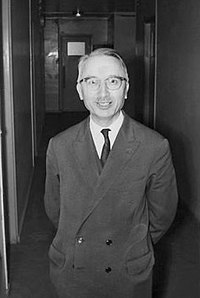Henri Paul Cartan
| Henri Cartan | |
|---|---|

Henri Cartan in 1968
|
|
| Born |
July 8, 1904 Nancy, France |
| Died | August 13, 2008 (aged 104) Paris, France |
| Nationality | French |
| Alma mater | École Normale Supérieure |
| Known for | Cartan's theorems A and B |
| Awards | Wolf Prize (1980) |
| Scientific career | |
| Fields | Mathematics |
| Institutions | University of Paris |
| Doctoral advisor | Paul Montel |
| Doctoral students |
Jean-Paul Benzécri Pierre Cartier Jean Cerf Jacques Deny Adrien Douady Pierre Dolbeault Roger Godement Max Karoubi Jean-Louis Koszul Jean-Pierre Serre René Thom |
Henri Paul Cartan (French: [kaʁtɑ̃]; July 8, 1904 – August 13, 2008) was a French mathematician with substantial contributions in algebraic topology. He was the son of the French mathematician Élie Cartan and the brother of composer Jean Cartan.
Cartan studied at the Lycée Hoche in Versailles, then at the École Normale Supérieure in Paris, receiving his doctorate in mathematics. He taught at the University of Strasbourg from November 1931 until the outbreak of the Second World War, after which he held academic positions at a number of other French universities, spending the bulk of his working life in Paris.
Cartan is known for work in algebraic topology, in particular on cohomology operations, the method of "killing homotopy groups", and group cohomology. His seminar in Paris in the years after 1945 covered ground on several complex variables, sheaf theory, spectral sequences and homological algebra, in a way that deeply influenced Jean-Pierre Serre, Armand Borel, Alexander Grothendieck and Frank Adams, amongst others of the leading lights of the younger generation. The number of his official students was small, but includes Adrien Douady, Roger Godement, Max Karoubi, Jean-Louis Koszul, Jean-Pierre Serre and René Thom.
...
Wikipedia
